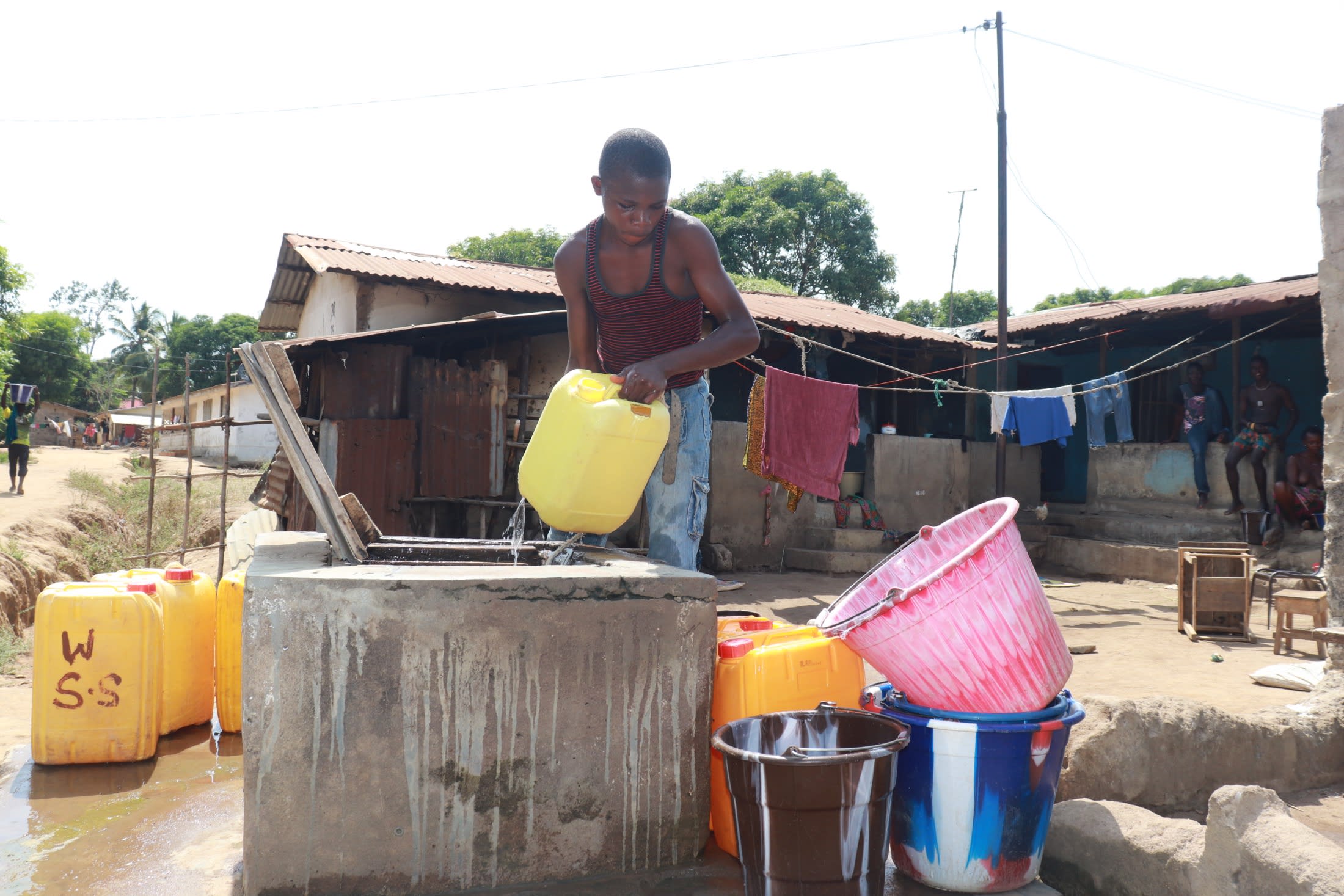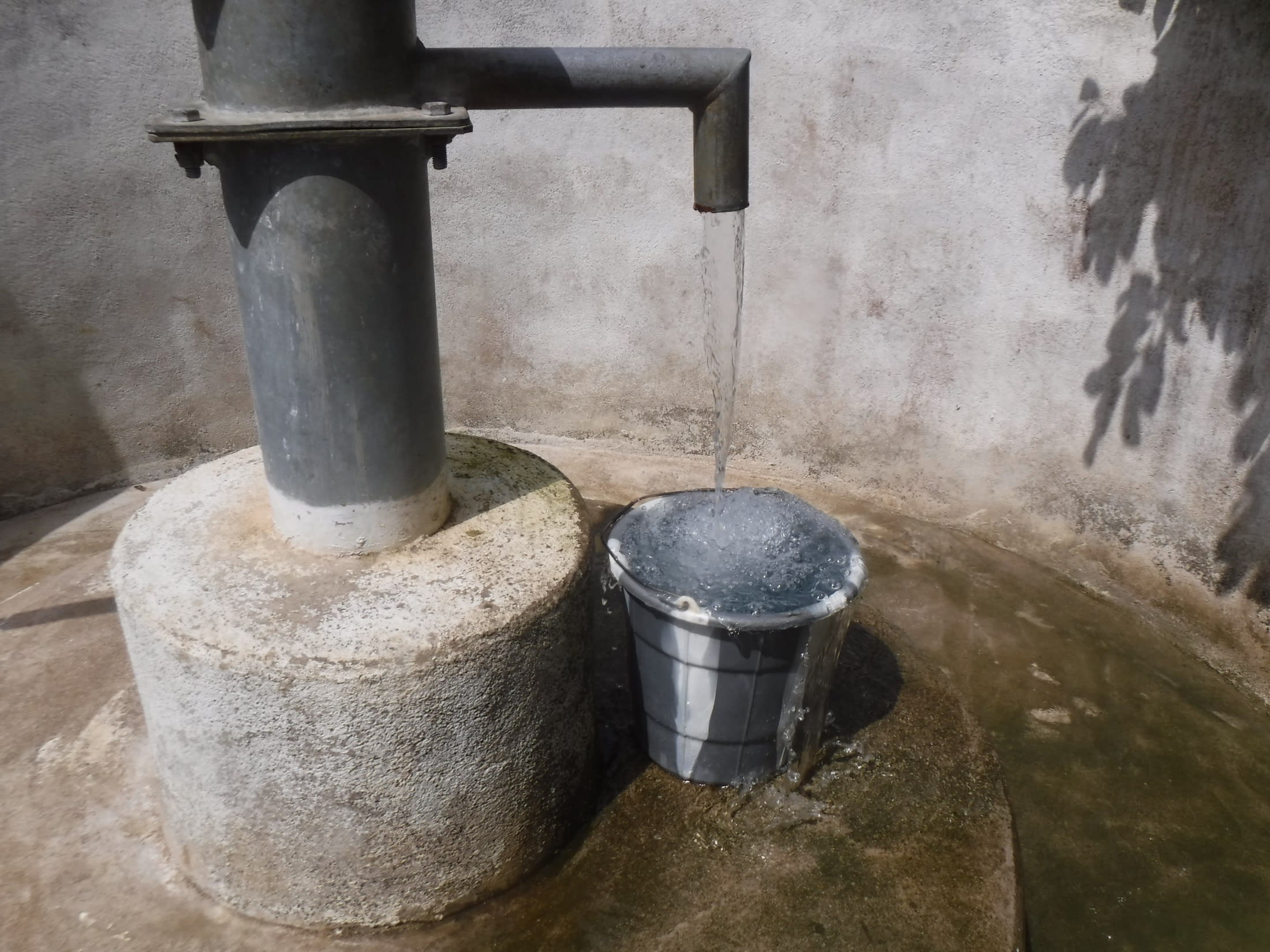December, 2021: 3 Ahmed Drive Well Rehabilitation Complete!
We are excited to share a safe, reliable water point at Gboro, 3 Ahmed Drive in Sierra Leone is now providing clean water to students and neighboring community members! We also conducted hygiene and sanitation training, which focused on healthy practices such as handwashing and using latrines.
"Before, life was not good without good water, but now, life has become safe and easy," said 17-year-old Saidu K. "The well is clean, and it is good to drink water from this source. It is located at a point not far from my house and [it will be] very easy to visit at any time to fetch water."

Saidu using the new well.
"I can now fetch enough water without any delay on the time for me to attend school, and I will no longer stay at any well at late hours waiting to fetch water," Saidu continued. "I don't need more energy to go around the whole community searching for drinking water anymore!"
"I am very happy for the well. It is a good thing I must recognize because it has always been my prayer request," said Adama Bangura, a local trader.

In this photo, Adama is the one in the center.
Adama went on to tell us about all the problems this well will solve in her life. "The water situation in this community was not a good thing because the sources we had are not safe for drinking. I can now have more time to do more of my daily activities on time, and my children will now be prepared early for school. This water source is not far from my house. I believe it is an opportunity, especially for our children, who used to [be out] late away from home, searching for water."

Councilor Fatmata Akai with some of the community children.
We held a dedication ceremony to officially hand the rehabilitated well over to the community, which was attended by several local dignitaries: Mr. Osman Fofanah from the Ministry of Water Resources, Mr. Abu Bakarr Bangura from the Port Loko District Council, Ward (240) councilor Fatmata Akai, and local pastor Albert Koroma, who is the chairperson of the new water user committee. Each person took the opportunity to make a statement thanking everyone who contributed to the new water source for Gboro community. Everyone was in a jubilant mood, clapping, dancing, and singing gospel songs giving thanks to God.

Saidu and Adama both made statements as well, expressing their thanks for the gift of safe, reliable water at their doorstep. Everyone sang even after the event was officially over!
Clean Water Restored
The drill team arrived the day before beginning work. They set up camp and unpacked all of their tools and supplies to prepare for drilling the next day. The community provided space for the team to store their belongings, along with meals for the duration of their stay. The following day, the work began.
First, we raised the tripod, the structure we use to hold and maneuver each of the drilling tools. Next, we measured the well's original depth. We then socketed the pipes and installed a casing.

Finally, we lined up the drill rods and started to drill! We reached a final depth of 11 meters with water at 1 meter. The hand-drill method allowed the team to install the cylinder far below the aquifer so that the community has great water access throughout the year.

With drilling complete, we installed screening and a filter pack to keep out debris when the water is pumped. We then cemented an iron rod to the well lining and fixed it with an iron collar at the top. Next, we bailed the well by hand for three days and flushed it, clearing any debris generated by the drilling process. Finally, we tested the yield to ensure the well would provide clean water with minimal effort at the pump.

Yield test in progress.
As the project neared completion, we built a cement platform, walls, and drainage system around the well to seal it off from surface-level contaminants. The drainage system helps to redirect runoff and spilled water to help avoid standing water at the well, which can not only be uncomfortable but unhygienic and a breeding ground for disease-carrying mosquitoes.
At last, we installed the stainless steel India Mk11 pump and conducted a water quality test. The test results showed that this is clean water fit for drinking!

New Knowledge
Before conducting any hygiene training, we made repeated phone calls and visits to the local water user committee to better understand the community's challenges and lack of sanitation facilities. We shared the findings from our discussions with the committee members to help them make the necessary adjustments before the training began. For example, we identified households without handwashing stations or ones that may need to repair their latrines. With this information, community members worked together to improve hygiene and sanitation at home.
After this preparatory period, we scheduled a time when members from each household using the water point could attend a multi-day hygiene and sanitation training. We then dispatched our teams to an open space next to a community member's home under some mango trees to hold the meeting. All of the community's 22 households were represented each day of training, which is a major success.

Training topics covered included handwashing and tippy taps, good and bad hygiene habits, disease transmission and prevention, worms and parasites, dental hygiene, proper care of the well's pump, keeping the water clean, the cost recovery system, dish racks and clotheslines, the importance of toilets, keeping latrines clean, balanced diets, the diarrhea doll, and HIV and AIDS.

Community members ask questions.
"Mask wearing is the part I found very helpful," said pastor Albert Koroma. "Thinking of my condition, as a blind man, I will not be able to observe the physical distancing, which is the six feet away from other people, while in public gatherings, as you can see. But the properly fitted mask on my face will greatly prevent me from getting infected. [The] proper way of mask-wearing can not only prevent me from contacting COVID-19, but will also prevent me from contracting other airborne diseases."
"During this training, I have learned things that have not heard about since I came into existence," said Mabinty Koroma, a local trader. "Through this training, I have come to know about the importance of clotheslines, which I personally was not in the habit of using to hang clothes. I thought drying clothes on the ground [made them] dry faster than hanging them on clotheslines. I never knew that skin diseases get to us through clothes dried on the ground or on grasses."

The most memorable topic for this community was malaria. It turned out that no one in the community knew that the cause of malaria was from an infected mosquito's bite. In the past, they had blamed the disease on consuming raw vegetable oil, oranges, and mangoes, or by drinking a lot of beer. Many of the people had lost loved ones to the disease.

Demonstrating the proper use of a mosquito net.
One elderly woman burst into tears as she remembered her late son, the breadwinner of her family, who died from malaria, leaving her to care for her two grandchildren. She blamed the death of her son on traditional beliefs because, during her son's illness, she had taken him to a native doctor, thinking his illness was due to witchcraft. She spent every single cent she had, but to no avail. She advised everyone present at the training to pay attention to the facilitators and take malaria seriously.
Mabinty concluded: "I am not educated, but through this training, I have gotten the awareness on how to care for myself, [my family], and [the] community at large. I strongly believe I can make [a] positive change in this community. And I am with everyone to start putting into practice all that we have gathered from this training, to improve on our way of living, to achieve a healthy community."
Thank you for making all of this possible!


 Borehole Well and Hand Pump
Borehole Well and Hand Pump


































